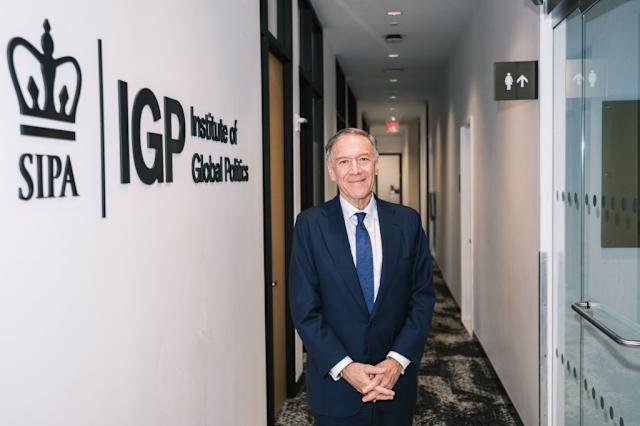Debate Erupts Over Mike Pompeo’s Appointment at SIPA’s Institute of Global Politics
(Photo/Stephen Yang/The New York Post)
By Inés Saldivar-Arias
New York, NY – The appointment of former Secretary of State Mike Pompeo as a Distinguished Fellow at the Institute of Global Politics (IGP) at Columbia University’s School of International and Public Affairs (SIPA) has sparked a debate among students over the institution’s decision to give a platform to polarizing figures.
Pompeo has had an illustrious career, holding prominent political roles as a Member of the House of Representatives from Kansas, Director of the CIA, and as the 70th Secretary of State of the United States. During his tenure in Congress he participated in several committees and was the main sponsor of the SAFL Act, a legislation that passed the House of Representatives that required food producers to inform the FDA of bioengineered foods. The bill did not pass the Senate, but it did influence the current legislation.
Yet Pompeo’s political career is as contentious as it is prominent. Infamously, during his 2010 Congressional campaign, he faced backlash for sharing on his campaign Twitter account an article in which his Indian-American opponent, Raj Goyle, was referred to as an “evil turban topper.” Pompeo later issued an apology for the incident. Beyond this, Pompeo’s career has been marked by consistently opposing progressive policies, including environmental regulations, the Affordable Care Act, abortion rights in instances of rape, and same-sex marriage. Moreover, he has been subject to multiple investigations related to unethical behaviour and undue political proselytism during his tenure as the U.S. Secretary of State.
The tension posed by his successful career in U.S. politics and his polarizing views has opened an important debate among students. While some see value in learning from high-level practitioners, others argue that appointing individuals with controversial trajectories contradicts the university’s core values.
Jane D.—an IGP student scholar who agreed to comment under a pseudonym due to the political persecution of international students—criticized Pompeo’s appointment, calling it “a joke,” noting that hiring an “openly racist individual” “goes inherently against the values that SIPA upholds.” She also felt that Pompeo’s hiring looks like a poorly executed PR stunt to prove SIPA can work with both Democrats and Republicans.
In contrast, the IGP leadership focuses on how engaging with successful practitioners from different sides of the political spectrum is an enriching opportunity for policy students. An IGP staff member stated in an email interview, “Our students are in a rare position to learn directly from these individuals, some of whom they will be aligned with and some of whom they will not. Engaging with people whose views differ from one’s own is a worthwhile and vital part of the SIPA education and one which IGP seeks to support.”
Some students agree. Jared F., a SIPA student, shared, “I am a Democrat, I don’t agree with [Pompeo’s] views, but we’re a policy school and there are only so many people who have held those roles.” He added, “It’s also a great opportunity to engage and debate with those we disagree with. It’s up to us to have the good conversations.”
Pompeo is not the first IGP-affiliated figure to spark student discontent. In 2023, former Secretary of State and 2016 Democratic presidential nominee Hillary Clinton joined SIPA as a co-instructor and Chair of IGP. Her course, Inside the Situation Room, drew criticism and even student walkouts over her role in U.S. military interventions in the Middle East.
Another IGP student scholar, also speaking anonymously, citing career considerations, noted, “It’s not about partisanship—but the IGP keeps bringing in hawks,” referring to politicians known for aggressive foreign policy stances.
Nevertheless, the IGP holds steady on its recruitment decisions. In the same interview, the IGP further added: “Our goal is to identify a cohort of remarkably successful and influential individuals from all over the world with expertise in different sectors and representing different views.”
Some students question whether the fellowship program lives up to its promise of ideological and geographical diversity. Of the 16 Carnegie Distinguished Fellows currently affiliated with the Institute, 10 are from the United States—comprising seven men and three women—while only six are from other countries, including two men and four women. Critics argue that this composition reflects a narrow range of perspectives and reinforces a U.S.-centric narrative within the Institute.
Other students have raised concerns in public forums about the financial structure behind these appointments. In response, the IGP clarified that the Institute does not use tuition income or student fees. Fellows are supported by the Carnegie Corporation of New York, and IGP’s budget is drawn from donor funds.
As the debate continues, SIPA confronts a larger question: Does the presence of prominent but controversial figures enrich academic discourse—or does it compromise the institution’s values? Can students learn from those they perceive as challengers of the ethical considerations taught in our classrooms? For now, this conversation is far from settled.

